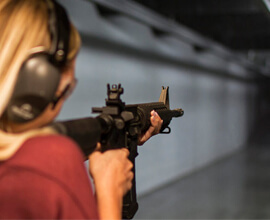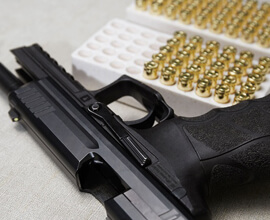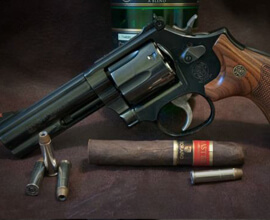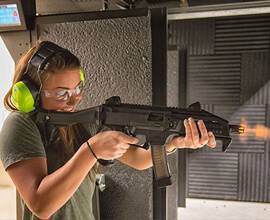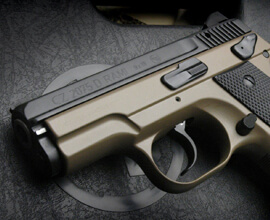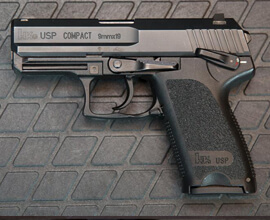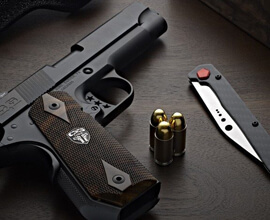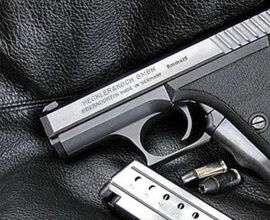Purchasing a firearm in California
According to the Attorney General for the State of California:
Generally, all firearms purchases and transfers, including private party transactions and sales at gun shows, must be made through a California licensed dealer under the Dealer’s Record of Sale (DROS) process. California law imposes a 10-day waiting period before a firearm can be released to a purchaser or transferee.Pursuant to Penal Code section 27510, a California licensed dealer is prohibited from selling, supplying, delivering, transferring or giving possession or control of any firearm to any person under the age of 21 years, except as specifically exempted. The exemptions apply to the sale, supplying, delivery, transfer, or giving possession or control of a firearm that is not a handgun to a person 18 years of age or older.
The Exemptions Include:
- A person 18 years of age or older who possess a valid, unexpired hunting license issued by the Department of Fish and Wildlife.
- An active peace officer, as described in Chapter 4.5 (commencing with Section 830) of Title 3 of Part 2, who is authorized to carry a firearm in the course and scope of his or her employment.
- An active federal officer or law enforcement agent who is authorized to carry a firearm in the course and scope of his or her employment as a reserve peace officer.
- A person who provides proper identification of his or her active membership in the United States Armed Forces, the National Guard, the Air National Guard, or active reserve components of the United States.
- A Person who provides proper identification that he or she is an honorably discharged member of the United States Armed Forces, the National Guard, the Air National Guard, or active reserve components of the United States.
As part of the DROS process, the purchaser must present “clear evidence of identity and age” which is defined as a valid, non-expired California Driver’s License or Identification Card issued by the Department of Motor Vehicles (DMV). A military identification accompanied by permanent duty station orders indicating a posting in California is also acceptable.If the purchaser is not a U.S. Citizen, then he or she is required to demonstrate that he or she is legally within the United States by providing the firearms dealer with documentation containing his/her Alien Registration Number or I-94 Number.Purchasers of handguns must provide proof of California residency, such as a utility bill, residential lease, property deed, or government-issued identification (other than a driver license or other DMV-issued identification), and either (1) possess a Handgun Safety Certificate (HSC) plus successfully complete a safety demonstration with their recently purchased handgun or (2) qualify for an HSC exemption.(Pen. Code, § § 26800-26850.)
Collecting handguns
According to the Attorney General for the State of California:
There is no limit to the number of handguns that you may own but you are generally limited to purchasing no more than one handgun in any 30-day period. Handgun transactions related to law enforcement, private party transfers, returns to owners, and certain other specific circumstances are exempt from the one-handgun-per-30-day purchase limit.
(Pen. Code,§ 27535.)
What identification is required to purchase a firearm?
Clear evidence of identity and age is defined as a valid California driver license or a valid California identification card issued by the Department of Motor Vehicles. Military identification is also acceptable if accompanied by permanent duty station orders indicating a posting in California, but the dealer must retain copies of both documents.
Temporary driver licenses and temporary identification cards are not accepted forms of proof of identity and age.
(Pen. Code, §§ 26815, subd (c))
What happens if there is a problem with the purchaser's driver license?
If DROS information conflicts with the Department of Motor Vehicles (DMV) driver license files or if the license is suspended or invalid, DOJ will cancel the transaction and notify the firearms dealer. The purchaser should contact DMV to correct or update information in DMV’s files. Once the DMV issue has been cleared, a new DROS may be initiated.
(Pen. Code, §§ 26815, subd (c))
What documentation is acceptable proof of residency for handgun purchasers?
A. Utility bill from within the past three months that bears on its face the individual’s name and either of the following:
1. The individual’s current residential address as declared on the DROS; or
2. The individual’s residential address as it appears on his or her California driver license or California Identification Card, or change of address attachment thereto. “Utility bill” means a statement of charges for providing service to the individual’s residence by either a physical connection (i.e. hard wired internet, telephone connection or cable connection, or a water or gas pipeline connection) or a telemetric conncetion (i.e. satellite television or radio broadcast service) to a non-mobile, fixed antenna reception device.
B. Residential lease that bears the individual’s name and either of the following:
1. The individual’s current residential address as declared on the DROS form; or
2. The individual’s address as it appears on his or her California Driver License or California identification card, or change of address attachment thereto. “Residential Lease” means either of the following:
– A signed and dated contract by which the individual (tenant) agrees to pay a specified monetary sum or provide other consideration for the right to occupy an abode for a specified period of time; or
– A signed and dated rental agreement by which the individual (tenant) agrees to a pay a specified monetary sum or provide other consideration at fixed intervals for the right to occupy an abode.
C. Property deed that bears the individual’s name and either of the following:
1. The individual’s current residential address as declared on the DROS form; or
2. The individual’s address as it appears on his or her California Driver License or California Identification Card, or change of address attachment thereto. “Property deed” means either or the following:
– A valid deed of trust for the individual’s property of current residence that identifies the individual as a grantee of the trust; or
– A valid Certificate of Title issued by a licensed title insurance company that identifies the individual as a title holder to his or her property of current residence.
D. Current, government-issued license, permit, or registration, otehr than a California Driver License or California Identification Card, that has a specified expiration date or period of validity. The license, permit, or registration must bear the individual’s name and either of the following:
1. The individual’s current residential address as declared on the DROS form; or
2. The individual’s address as it appears on his or her California Driver License, California Identification Card, or change of address attachment thereto.
Examples of ACCEPTABLE proof of residency:
According to the Attorney General for the State of California:
- Carry Concealed Weapon (CCW) Permit
- Certificate of Eligibility (COE.)
- Curio and Relic (C&R) Federal Firearms License (03FFL) with name and address
- Current DMV Disabled Placard.
- Current DMV Registrations.
- Electricity, gas, cable bill with purchaser’s name on it from within the last 3 months.
- Resident Hunting License issued by Department of Fish and Wildlife.
- Fishing License: Commercial, Resident Sport, Lifetime, 1, 2, and 10 day licenses issued by the Department of Fish and Wildlife.
- Signed, dated and notarized rental agreement/contract.
Examples of documents that are NOT acceptable proof of residency:
According to the Attorney General for the State of California:
- Active Duty Military Spouse ID
- Bank Statement
- Brown Card
- Cellular Phone Bill
- Fishing Validations and Report Cards
- Hunting license-standard, self-filled
- Pay stub
- Voter registration
How can I obtain a Carry Concealed Weapon (CCW) license?
According to the Attorney General for the State of California:
Contact your county sheriff’s office or, if you are a resident of an incorporated city, your city police department, for information on obtaining a CCW license. They can answer your questions and provide you with a copy of their CCW license policy statement and the CCW license application. If you live within an incorporated city, you may apply to the police department or the county sheriff’s office for a CCW license. However, only residents of a city may apply to a city police department for a CCW license.
(Pen. Code, §§ 26150-26225.)
Can I give a firearm to my spouse or registered domestic partner? Can he/she give it back to me later?
According to the Attorney General for the State of California:
Yes, as long as the person receiving the firearm is not in a prohibited category, pdf and the firearm is legal to possess (e.g., not an assault weapon), the transfer of a firearm between a husband and wife or registered domestic partners is exempt from the requirement to use a licensed dealer to perform the transfer.
If the firearm is a handgun, the recipient must obtain a Handgun Safety Certificate prior to taking possession and must also submit a Report of Operation of Law or Intra-Familial Handgun Transaction, pdf and $19 fee to the DOJ within 30 days after taking possession.
The same rules apply to the return of the firearm at a later date.
(Pen. Code, §§ 16990, subd. (g), 27915, 27920, subd. (b).)
Can I give a firearm to my adult child? Can he/she give it back to me later?
According to the Attorney General for the State of California:
Yes, as long as the adult child receiving the firearm is not in a prohibited category, pdf and the firearm is legal to possess (e.g., not an assault weapon). The transfer of a firearm between a parent and child or a grandparent and grandchild is exempt from the dealer transfer requirement. The exemption does not apply to step-children/step-parents, brothers, sisters, aunts, uncles, or cousins.If the firearm is a handgun, the recipient must obtain a Handgun Safety Certificate prior to taking possession and must also submit a Report of Operation of Law or Intra-Familial Handgun Transaction and $19 fee to the DOJ within 30 days after taking possession.The same rules apply to the return of the firearm at a later date.(Pen. Code, §§ 27870-27875, 30910-30915.)
May I carry a concealed firearm in California?
According to the Attorney General for the State of California:
Generally you may not carry a concealed firearm on your person in public unless you have a valid Carry Concealed Weapon (CCW) license. CCW licenses are issued only by a California county sheriff to residents of the county, or the chief of police to residents of the city. California law does not honor or recognize CCW licenses issued outside this state.
(Pen. Code, §§ 25400-25700, 26150-26225.)
Who is prohibited from owning or possessing firearms?
According to the Attorney General for the State of California:
Any person who has a conviction for any misdemeanor listed in Penal Code section 29805 or for any felony, or is addicted to the use of any narcotic drug, or has been held involuntarily as a danger to self or others pursuant to Welfare and Institutions Code section 8103 is prohibited from buying, owning, or possessing firearms or ammunition. There are also prohibitions based on mental conditions, domestic restraining/protective orders, conditions of probation, and specific offenses committed as a juvenile. A list of prohibited categories is available on the Bureau of Firearms website.(Pen. Code, §§ 29800, 29805, 29815, 29820, 29825, 29855, 29860, 29900, 29905, 30305; Welf. & Inst. Code, §§ 8100-8103; 18 U.S.C. § 922, subd. (g), 27 C.F.R. § 478.22.)
Can I sell a gun directly to another person (i.e. non-dealer)?
According to the Attorney General for the State of California:
Generally, no. This type of transaction is referred to as a “private party transfer” and must be conducted with both parties, in person, through a fully licensed California firearms dealer. Failure to do so is a violation of California law. The purchaser (and seller if the purchaser is denied), must meet the normal firearm purchase and delivery requirements.
Firearms dealers are required to process private party transfers upon request but may charge a fee not to exceed $10.00 per firearm for conducting the transfer. For example:
- For private party transfers, the total allowable fees, including the DROS, safety, and dealer transfer fees, are not to exceed $47.19 ($37.19 DROS fee and $10.00 PPT fee), and $10.00 for each subsequent firearm.
“Antique firearms,” as defined in section 921(a)(16) of Title 18 of the United States Code, and curio or relic rifles/shotguns, defined in section 478.11 of Title 27 of the Code of Federal Regulations that are over 50 years old, are exempt from this requirement. For additional exceptions, refer to Penal Code sections 27850 through 27966.
(Pen. Code, § 27545, 28055)
Are there any exemptions from the waiting period?
According to the Attorney General for the State of California:
Yes, but they don’t apply to the general public. For example, waiting period exemptions include the following:
- Firearms dealers and persons who have obtained special weapons permits issued by the DOJ are exempt from the waiting period.
- Persons with a Curio & Relic collector’s licenses issued by the ATF and who have a valid Certificate of Eligibility issued by the DOJ are exempt from the waiting period when purchasing curio and relic firearms.
- Peace officers with authorization from the head of his/her agency.
(Pen. Code, §§ 26950-26970, 27650-27670.)
I am moving into California and I own several firearms. What are the new-resident registration requirements?
According to the Attorney General for the State of California:
Yes, but they don’t apply to the general public. For example, waiting period exemptions include the following:
- You are considered a personal firearm importer as defined by California law. You may bring all of your California-legal firearms with you, but you must report them all to the California Department of Justice within 60 days as required utilizing the New Resident Firearm Ownership Report (BOF 4010A), pdf. You may not bring ammunition feeding devices with a capacity greater than ten rounds, machine guns, or assault weapons into California.(Pen. code, §§ 17000, subd. (a), 27560.)
How do I know if my firearms need to be registered?
According to the Attorney General for the State of California:
There is no firearm registration requirement in California except for assault weapon owners and personal handgun importers. However, you must submit a Firearm Ownership Report (FOR) Application (BOF 4542A), pdf to the California Department of Justice (the Department) for any firearm you are seeking return where no other record is on file with the Department identifying you as the most recent owner/possessor.
Having a FOR application on file with the Department will authorize the return of your firearm in the event it is subsequently lost or stolen. With very few and specific exceptions, all firearm transactions must be conducted through a firearms dealer. If you purchased a handgun from a properly licensed California firearms dealer and underwent a background check via the state’s Dealer’s Record of Sale (DROS) process, a record of your handgun purchase is already on file with the Department. Therefore, it should not be necessary for you to submit a FOR application for handguns previously purchased in California. Unfortunately, this is not the case with regards to rifles or shotguns. Prior to January 1, 2014, the Department was prohibited by law from retaining DROS long gun information.


